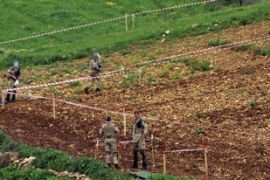Britain bans dumb cluster bombs
Charities say the ban does not go far enough.

Published On 20 Mar 2007
Campaigners say the bombs often fail to explode on impact, and can kill civilians years after a war ends.
Britain and the US used thousands of cluster bombs during the invasion of Iraq in 2003 and Israel fired them widely into southern Lebanon last year during fighting with Hezbollah guerrillas.
Des Browne, the defence secretary, said: “It is our duty to make sure our forces have the equipment they need to do the job we ask of them. At the same time, we should strive to reduce civilian casualties to the minimum.
“Military commanders are first to point out that modern conflicts are in large part about winning hearts and minds.”
But Simon Conway, director of Landmine Action UK, said the self-destruct mechanisms on the newer British bombs, identical to ones used by Israelis during a war in Lebanon last year, were not reliable enough to make them safe.
“These are littered all over southern Lebanon because they failed and the self-destruct mechanisms failed,” he said.
In some cases the new bombs have actually proven harder to clear than the old ones because the self-destruct mechanism carries an extra detonator, making them even more dangerous.
Austria and Norway have banned all unguided cluster weapons, not just those without self-destruct mechanisms.
Still, he said, it was a sign of progress that Britain was acknowledging that civilian casualties were a problem.
“It’s a good step. What they need to do is acknowledge that sticking a self-destruct mechanism on to a munition isn’t enough.
“In our view, ‘smart’ means precision-guided, and attaching self-destruct mechanisms to an unguided area effect weapon does not make it ‘smart’.”
Source: News Agencies